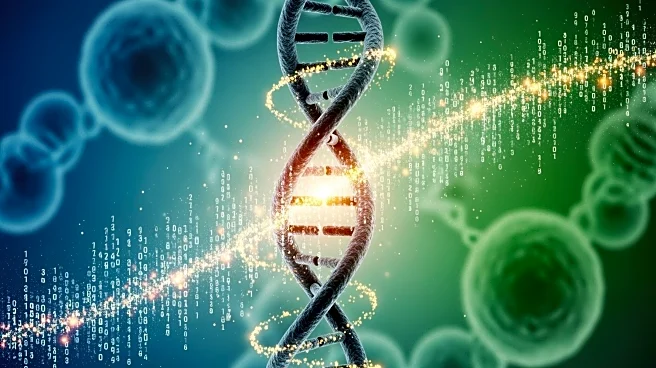What's Happening?
Recent research has explored the genetic determinants and genomic consequences of non-leukemogenic somatic point mutations. Utilizing 51,399 whole genome sequencing samples from NHLBI TOPMed, the study identified candidate somatic variants and developed
a method termed GEM (genomic and epigenomic mutation rate) to distinguish true somatic mutations from artifacts. The study found that chromatin state significantly influences mutation rates, with mutations in quiescent chromatin being more strongly associated with age than those in transcriptionally active chromatin. Additionally, the research identified several genome-wide significant loci, including TERT and TCL1A, which are associated with clonal hematopoiesis. The study also highlighted the role of germline genetic determinants in influencing mutation burden, suggesting a complex interplay between genetic variation and somatic mutation rates.
Why It's Important?
Understanding the genetic determinants of somatic mutations is crucial for advancing knowledge in fields such as cancer research and aging. The identification of specific loci associated with mutation burden can lead to better insights into the mechanisms of clonal hematopoiesis, which is linked to various health conditions, including cardiovascular diseases. This research could pave the way for developing targeted therapies that address the underlying genetic factors contributing to somatic mutations. Moreover, the study's findings on chromatin state and mutation rates may inform future research on epigenetic influences in disease progression and aging.
What's Next?
The study's findings suggest potential avenues for further research into the genetic and epigenomic factors influencing somatic mutations. Future studies may focus on validating the identified loci and exploring their roles in disease mechanisms. Additionally, the development of more sophisticated models to predict mutation burden based on genetic and epigenomic annotations could enhance the accuracy of disease risk assessments. Researchers may also investigate the therapeutic implications of modulating chromatin states to reduce mutation rates and improve health outcomes.
Beyond the Headlines
The research highlights the ethical considerations in genetic studies, particularly concerning privacy and the use of genetic data. As genetic determinants of health become more understood, there may be increased discussions around the implications of genetic screening and personalized medicine. Furthermore, the study underscores the importance of interdisciplinary approaches, combining genomics, epigenomics, and bioinformatics, to unravel complex biological phenomena.

















